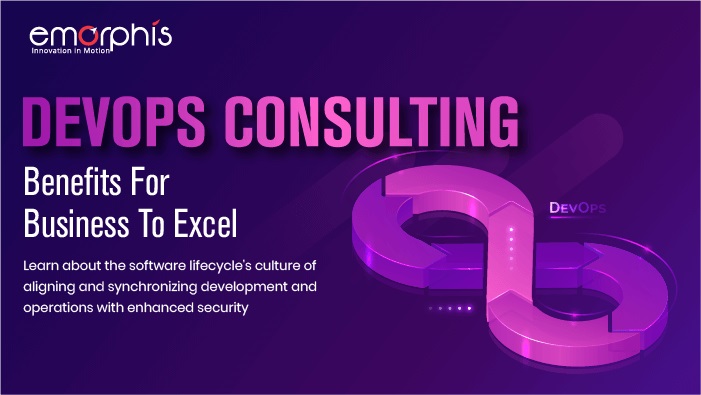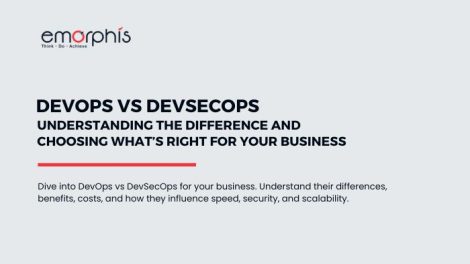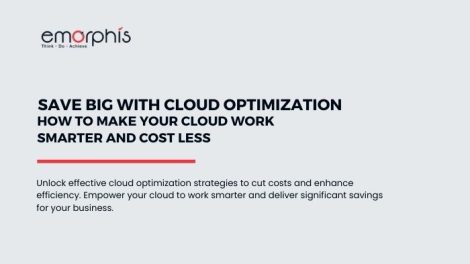Introduction
In earlier days, some sort of barrier was nonexistent between developers and operators even if they were working for its completion with the same objective. Until recently, developers focused on implementing business specifications speedily to end up offering effortlessly work products. On the other side, operators hold the only responsibility to assist make the item work in just about all conditions. If anything does not go as per their requirement, everyone was in grave danger. To end such a long tussle between developers and operators DevOps Consulting Services and solutions came into the force. Due to the given solutions, there has been significant improvement in the relationship between both the developers and the operator's team. They now work in unity to create the final product and offer it to the customers at the best quality.
What is DevOps?
DevOps (a combination of development+ operation) is a term that embeds numerous apps and tools. In this way, the delivery of services is much faster than what is being offered by traditional software solutions. With DevOps at the helm, businesses are delighted to serve their clients within a best-suited method and have a significant reach to the particular software market.
Now, how do DevOps functions? Before proceeding forward, it is essential to understand how the given technology functions. One thing everyone must remember:
DevOps works well when development and operational teams work together!
They will not turn into siloed and mix to make a single team for the accomplishment of complete DevOps lifecycle phases. It starts from development to testing and application and creates the apps that come in the market with multiple functions.
What's more, they use automation to ensure quality assurance and security to offer the best package of software applications for the clients.
The DevOps Process Flow
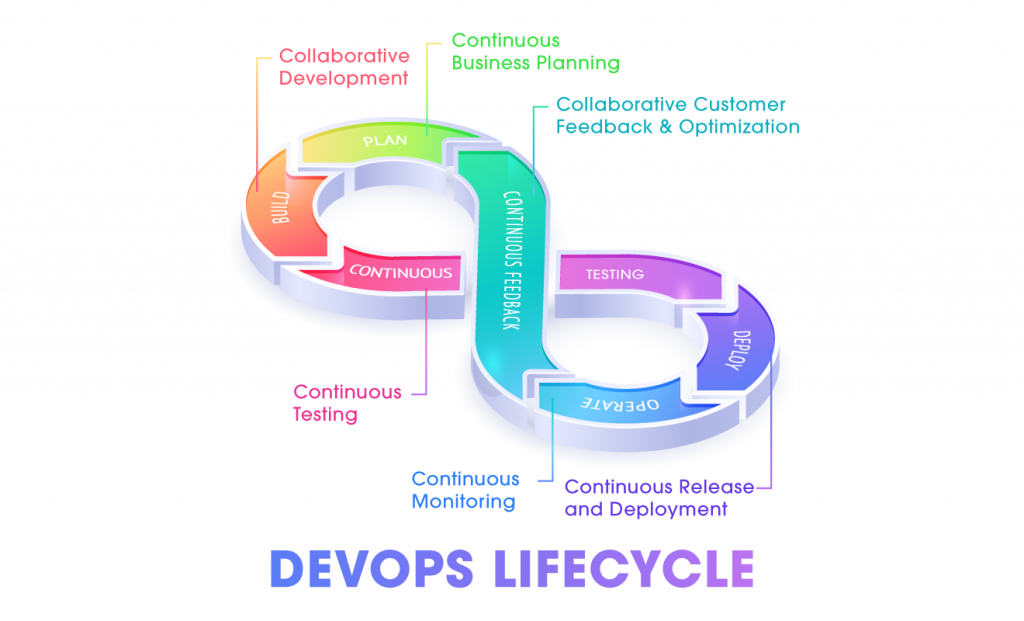
What does the DevOps process flow convey?
It comprises two essential aspects of software development in present times: agility and automation.
Several phases define a complete DevOps lifecycle, and its main emphasis is on closing the loop that acts as a barrier between development and operations and even enhancing production through five essential elements:
A. Continuous Development
It is an umbrella term for all the iterative procedures that define the delivery of DevOps Consulting Services to the customers. With a continuous development strategy, the enterprise can achieve supplying products (with high quality, low risks) at a swift pace to the customers with no stoppage from the bandwidth barriers.
B. Continuous Integration
It is one of the common software development practices where developers merge their codes into a shared repository in a continuous manner. So, there is an insurance that developers have ready-made availability of valid and up-to-date code that helps in the prevention of project delay. Here, one can see a combination of speed and agility with security and reliability.
C. Continuous Testing
It is a verification procedure that assists the developers in checking the code is actually working in the live environment successfully. It also helps in identifying surface bugs that require immediate fixing and can be pushed back to improve them further.
D. Continuous Monitoring & Feedback
In the whole development pipeline, there must be scope for continuous monitoring and feedback about the products. It is done through the use of automation to identify issues and notify in real time. It will ensure a high level of security with an agile response when the issues come out during any phase.
E. Continuous Delivery (CD)
It is the next logical step where changes are built, tested and packaging is done automatically and then released for post-production. The major goal of CD is to release procedures to offer updates to the users in a rapid manner.
F. Continuous Deployment
It is a fully automated version of CD but with one exception: there is no need for human intervention! Here, there is no need to schedule release days with a feedback loop. Ideally, it is best suited when the DevOps process is accomplished. Furthermore, to make it successful, the enterprise must possess a reliable automated testing infrastructure.
What are the benefits of Outsourcing DevOps Consulting Services?
When someone faces challenges in building a DevOps team, the management of services is best possible through outsourcing DevOps Consulting Services. Why outsourcing?
The reason is that it gives companies some immense benefits. They get access to specialized skills with no bearing of additional costs (organizational and financial). When you have a clear need to develop an in-house DevOps outsourcing service; then adopting an effective approach will help them to reap enormous profits such as:
I. Uninterrupted Access to Top-Level Talents for DevOps Consulting Services
If you work on a cloud software infrastructure; it will not be an easy task to attract talented DevOps engineers. Nevertheless, if a company has a reputed DevOps service provider; then there will not be an issue. Why?
It's because they come with the right company culture and resources that not only help in retaining but also attract top talents into their fold. With such a level of outsourcing, the users can get better capabilities. Thus, it eradicates the many obstacles that come with building their own team.
II. Availability of Expertise at Lower Budget
When someone focuses on DevOps outsourcing, they stand vindicated. How? The answer is that you get access to a fully functional DevOps team that has several skill sets. They can function at a swift pace at a much lower price than a single full-time employee can work.
The given team helps to combine DevOps with cloud infrastructure that monopolizes the time and resources of your company. Thus, it negates the need to hire an in-house team.
III. Vendors Offer a Strong DevOps Culture
Hiring the best DevOps engineers is the surest way to achieve success. However, if you focus on appointing only a single DevOps engineer, then you are at a loss as they don't have the hunger to learn more and remain stuck where they are.
The solution to the given issue is the hiring of a managed DevOps service provider. They provide a deeper pool for mentoring and peer-to-peer awareness that helps in creating powerful team dynamics to make the work look smarter and more efficient.
IV. Flexible Nature to Find Best Fit
When you outsourced a DevOps solution, they will send you a DevOps engineer who will either be a bad fit or will lack a crucial skill that will be needed to make the project look fruitful. Nonetheless, there is no such issue. Why so?
It’s because getting access to a talented DevOps Consulting Services team will be a better fit for their functioning. What’s more, it will also save an organization that saves time and money in starting the hiring process again that will otherwise be a cumbersome one.
V. Efficient Handling of Risk & Costs Associated with Technology
DevOps Services and solutions need constant updating to keep the whole architect scalable and deliver them successfully. When you outsource the DevOps services, you can save indirect payment on additional research and development (R&D) and receive benefits of DevOps experimentation at just a fraction.
So, when an enterprise is focusing on implementing the new technology; the team already gets full training that lowers their cost and risk associated with it. Moreover, they also get more access to focus their resources in building their core: business.
The DevOps platform covers the market (both regional and global) with an in-depth analysis of the performance to understand the overall growth. It is an approach that aims to bond a relationship between operators and developers and facilitate efficient workflow.
Numerous tools facilitate the DevOps lifecycle most effectively. It includes API tools, configuration tools, automation tools, monitoring tools, and many others.
The report reveals that the global DevOps market size is forecasted to reach 2.63 million by 2028 from USD 0.67 million in 2021. It also showcases that the three manufacturers such as AWS, BMC Software, and Datadog capture 32% market share.
The highest contributor is North America, with an overall 50% market share. Besides, IT, Telecom, and retail are the leading adopters of DevOps tools.
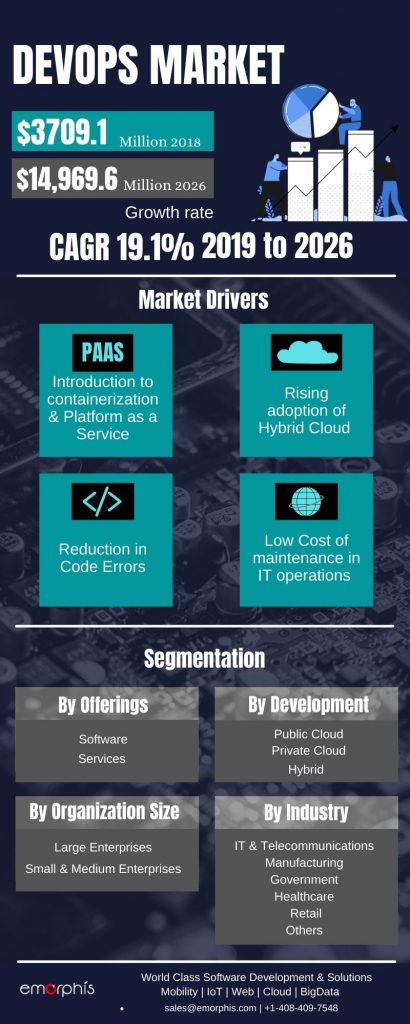
DevOps Consulting Trends to Watch for in 2022
Numerous marketing experts have predicted a bright future for DevOps Consulting. It is possible through new trends that are dominating in the market and have paved the way for DevOps to talk over it from other prevailing technologies. The recent trends to watch out for are:
a. Automation
Today is a fast-paced business atmosphere where automation and DevOps have become an integral part. What's more, the majority of the enterprises have automated their tasks to prevent the repetition process and save a large amount of time. The advantages of automation comes in the form of:
- Faster feedback
- Frequent releases
- High user experience
Even during COVID times, the mix of in-office and remote teams has brought together the core value of working in tandem and delivering the best results to the end-users. Moreover, there has been significant improvement in the communication and collaboration among the team. So, with increased remote working, automation is here to stay in the DevOps business model.
b. Low Code/No-Code will Need to Hasten Innovation
The rise of no-code has made the development process more simplified. Likewise, even a novice can kick-start their development journey using the given platforms. As with time, low code tools will gain maturity and will find wide acceptance among the business circle.
Besides, the report of Gartner has shown that low (or no) code applications will occupy around two-thirds of the activities related to application development. One must expect more and more organizations in the future that will help in meeting the growing demands of customers who love the digital environment.
c. Site Reliability Engineering will Define DevOps
DevOps Consulting is not just tools, automation, and procedure; it also encompasses a good amalgamation of all the given three with a Midas touch through SRE. It utilized engineering principles to offer high operational performance.
Some experts have forecasted that more than 50% of the respondents now practice SRE to a greater extent. They also believe that SRE is known to drive it towards success with a high level of reliability.
d. Security First Through DevSecOps
Cyber-attacks are becoming common all over the online world. To cope with it, many enterprises are now integrating automation with security. It has been made possible through shifting from DevOps to DevSecOps, and it will gain momentum in 2022.
It will improve security aspects early in the development lifecycle as continuous monitoring and identifying and removing security defects can be done by teams. It will result in substantial improvement in the speed of quality delivery of the software products and services.
e. Kubernetes towards Development
It is an open-source container system that has emerged as a new trend from the operational side recently. Similarly, experts anticipate that it will expand further into the realm of software development in the future.
It will then help the DevOps team to leverage Kubernetes features early and will give the developer's machine enough time to produce the best result. Not only it will enhance the existing infrastructure, but it will also bring more technology to expand the mettle towards big development.
What are the Costs of DevOps services?
DevOps pricing comes in:
1. Microsoft Azure DevOps services
Microsoft Azure DevOps uses source code, package control, automation, and testing in simplified form and is best suited for small to large enterprises. It offers assistance in portfolio and release management. Microsoft Azure DevOps services prices come in two terms:
- Free for open-source projects and small projects (up to five users)
- For large teams, it ranges from $30/ month for 10 users to $6,150/month for 1000 users
2. AWS DevOps Services
Amazon services are powered by Machine Learning that helps in enhancing operational performance and reducing downtime costs. Usually, we offer AWS DevOps service free for a few users, but for large users our prices to get access to our AWS DevOps professionals starts and it follows:
- DevOps Support Plan Pricing: $60
- Business Support Plan Pricing: $6,150
- Enterprise On-Ramp Plan Pricing: $10,000
- Enterprise Support Plan Pricing: $70,500
Conclusion
DevOps is a vast topic, as the reader can understand after going through it. The given guide successfully explains the importance and benefits of DevOps and how it will be a crucial technology that will bring prosperity to any enterprise that adopts it wholeheartedly.
DevOps consulting services are gaining mass appeal among entrepreneurs and businesses alike. It aims to connect operators and developers into a single unified unit. We at Emorphis have an expertise DevOps team that utilizes services of hi-tech tools that helps the customers to get software products of the best quality.
Find more details for Everything You Should Know About DevOps.



